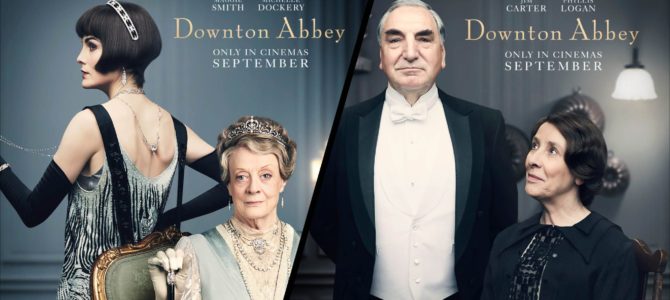
The “Downton Abbey” movie was not really a film, but a two-hour episode on the silver screen. Anyone expecting something different may be disappointed, but fans of the beloved PBS series will be enchanted by the return to Downton.
The film revisits the Crawley family in 1927, one year after the conclusion of the TV series. The main drama surrounds an unexpected visit by the king and queen of England to Downton, which thrills upstairs and downstairs alike.
When “Downton Abbey” was adapted into a film, its intended audience was clear: the passionate viewers. The ones who obsessively waited for the new seasons to premiere, were angered by Matthew’s car crash, shocked by Edith’s illegitimate daughter, warmed by Carson and Mrs. Hughes’ wedding, and attended the museum with excitement.
Those who do not feel the magic of sweeping shots of the estate, or instantly smile when hearing the opening bars of the theme song, may find the film frothy, charming yet wholly lacking in substance. People who adore the series will laugh aloud at every joke, thrill at the prospects of new romance, celebrate the protagonists’ victories, and feel great sympathy for the touching quiet moments.
The film expects viewers to have watched the entire series. There are brief reminders of where the show left off nearly four years ago, but doesn’t waste too much time with exposition. Throughout its runtime, conversations are filled with callbacks, inside jokes, and themes that will deeply resonate with those who spent six seasons falling in love with the Crawley family, their servants, and the romanticized world of turn-of-the century England.
The entire main cast returns, save for cousin Rose (Lily James). Even the retired staff, Mr. Molseley (Kevin Doyle) and Mr. Carson (Jim Carter) return to assist with the royal visit, the former due to overwhelming excitement, and the latter as a favor to surrogate daughter Lady Mary. Throughout the series’ run, the cast developed a fascinating rhythm punctuated with easy chemistry, and each actor inhabits his role with peerless humanity.
The handful of new characters had a steep challenge ahead, but performed impressively, melding into the ensemble as if they had been there the entire time. Highlights include Imelda Staunton’s Maud, the queen’s lady-in-waiting and an estranged cousin of Violet (Maggie Smith) locked in battle over her will, Maud’s cherished maid surprisingly redolent of the dearly departed Sybil (Jessica Brown Findlay), played charmingly by Tuppence Middleton, and Kate Phillips as the kind yet stifled Princess Mary.
The film shows a keen understanding of the highlights of the series, and leans heavily into them. The matriarchs and bickering best friends Violet and Isobel (Penelope Wilton) are given a large percentage of the dialogue filled with their signature witty one-liners and engaging back-and-forth. Violet has always been an incredibly quotable character, and the cinematic treatment brings out the best in her. Isobel, as always, is an excellent foil for Violet, and Wilton and Smith’s chemistry charms.
The grand love stories have always been a staple of the series, from Matthew (Dan Stevens) and Mary (Michelle Dockery), Anna (Joanne Froggatt) and Bates (Brendan Coyle), Sybil and Branson (Allen Leech), and countless others. The courtship and subsequent dramas drove many storylines, to the point where all but a handful of principal characters were in romantically partnered by the series finale.
The film understands the integral aspect of these romances on the story, and provides each major couple some intimate moment reminding viewers why we fell in love with these relationships in the first place. Most principals who left season six single are introduced to a potential romantic partner, which may feel a touch rushed, but the earnestness with which they are presented makes up for the breakneck courtship pace.
Pleasantly surprising to fans, several somewhat tired plot staples are foregone for more novel storylines. Robert (Hugh Bonneville) does not nearly bring the family to financial ruin. Edith (Laura Carmichael) and Mary are not pitted against each other, and their limited interactions are actually rather pleasant. Barrow (Robert James-Collier), now the butler, is a far more jovial and amicable presence, finally feeling accepted and valued. He had one of the most dramatic character arcs in the entire series, and its end results are heartwarming to watch on the silver screen.
Maybe most shockingly, Anna and Bates are happy. They are not beset by any tragedy, but have the liberty to lead the rest of the staff through hijinks. Fans of the show will remember that Bates and Anna are the show’s favorite punching bags. They were always only one episode away from unspeakable suffering, to the point where it became dull. Watching the couple scheme, joke, and laugh was a refreshing twist.
At its core, “Downton Abbey” was a love letter to a bygone era and its way of life. From the beginning, the series emphasized the importance of both the house and all it represents, symbolically and literally. It explored the inherent tension between tradition and modernity at the turn of the century, particularly for an aristocratic class whose way of life is dying. The film, just as the series, embraces the line between embracing the future with all it has to offer, while holding on to what has made the past so special.
“Downton Abbey” spent six seasons allowing its viewers to escape into a time vastly different from our own, and told us that this journey was important. Just as “Downton Abbey” was important to both the family and the village, the series was important to its viewers. The series has retained a passionate and loyal fan base, and this film was a perfect reward, which only could be improved by rebooting the series. Here’s hoping that this film is the first of many returns to Downton.









